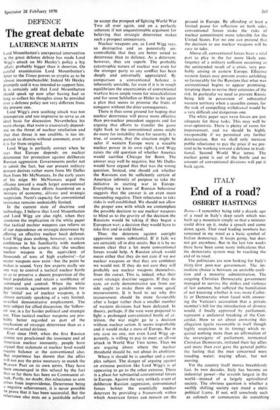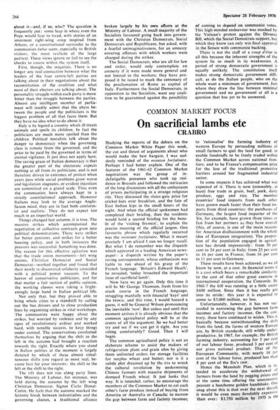ITALY
End of a road?
OSBERT HASTINGS
Rome—I remember being told a decade ago of a road in Italy's deep south which was
built up a mountain simply so that a minister could drive up it, make a speech and come down again. That road leading nowhere has remained in my mind as a basic symbol of Italian democracy. It keeps going, but does not get anywhere. But in the last few weeks there have been some nasty indications that the democratic system may be reaching the end of its road.
The politicians are now looking for Italy's thirty-first post-war government. The im- mediate choice is between an unstable coali- tion and a minority administration. The outgoing Christian Democratic government managed to survive the strikes and violence of last autumn, but suffered the humiliation of not knowing whether it was more Catho- lic or Democratic when faced with answer- ing the Vatican's accusation that a private member's bill for the introduction of divorce would, if finally approved by parliament, represent a unilateral breaking of the Con- cordat. How to set about answering this allegation (quite reasonable in itself though highly suspicious in its timing) which re- quired nothing more than an affirmation of the sovereignty of parliament, tormented Christian Democrats, irritated their lay allies and more than ever gave the general public the feeling that the men concerned were treading water; staying afloat, but not moving.
Yet the country itself moves breathlessly fast. In two decades, Italy has become an industrial power—the seventh largest in the world—instead of a largely agricultural society. The obvious question is whether a swiftly shifting society can stand a static political frame. If not, will somebody such as colonels or communists do something
about it—and, if so, who? The question is frequently put: some leap in where even the Pope would fear to tread, with stories of an imminent right-wing coup inspired from Athens, or a constitutional surrender to the communists (who seem, especially to British visitors, the most resilient of the large parties). These views ignore or fail to see the checks to excess within the system itself.
First, though, the iniquities. There is no longer any real connection between what the leaders of the four centre-left parties are talking about in their negotiations about the reconstitution of the coalition and what most of their electors are talking about. The personality struggle within each party is more bitter than the struggle between the parties. Almost any intelligent member of parlia- ment will readily admit that the abyss be- tween the people and the politicians is the biggest problem of all that faces them. But they have no idea what to do about it.
Italy is by legend a country which ill-treats animals and spoils its children. In fact the politicians are much more spoiled than the children. Political moralists talk about the danger to democracy when the governing class is remote from the governed, and the price to be paid by the governed in terms of eternal vigilance. It just does not apply here. The saving grace of Italian democracy is that the greater part of the electorate expects nothing at all from its politicians, and is not therefore driven to extremes of protest when years pass while social problems grow worse and legislation stagnates, or evident injustices are committed on a grand scale. Thus even the communists have always kept to a strictly constitutional approach. However Italians may look to the average Anglo- Saxon mind, they are in fact both conform- ist and realistic. They do not expect too much in an imperfect world.
Things changed last autumn, it is true. The massive strikes which accompanied the negotiation of collective contracts grew into political demonstrations. There were strikes for better pensions, and strikes for a better housing policy, and in both instances the pressure was successful. Something was done. The reason for this effective agitation was that the trade union movements—left wing unions, Christian Democrat and Social Democrat—worked together and found that their newly re-discovered solidarity coincided with a political power vacuum. To the horror of conservative politicians, and for that matter a fair section of public opinion, the working classes were taking a fright- eningly large hand in Italian political life. Not only that, but they proved able to bring whole cities to a standstill by calling out the bus drivers and to close production lines by organising strikes in vital workshops. The communists were happy about the strikes, but worried by violence and by any signs of revolutionary ardour and worked hard, with notable success, to keep things under control. The conservatives comforted themselves by arguing that the shift to the left in the autumn had brought a reaction towards the right. Exactly where you stand in Italian politics at the moment is largely dictated by which of these almost simul- taneous shifts you regard as most real, be- cause best for your interests: the shift to the left or the shift to the right.
The rift does not run ailing party lines. The Ministry of Labour, for instance, was held during the autumn by the left wing Christian Democrat, Signor Carlo Donat- Cattin. He feels that the autumn marked the
historic break between industrialists and the governing classes, a traditional alliance
broken largely by his own efforts at the Ministry of Labour. A small majority of the Socialists favoured going back into govern- ment with the Christian Democrats, Social Democrats and Republicans, but asked, with a fearful unimaginativeness, for an amnesty covering offences with which workers were charged during the strikes.
The Social Democrats, who "are all for law and order, would only contemplate an amnesty if it were made more general and not limited to the workers; they have pro- posed it be issued to mark the centenary of the proclamation of Rome as capital of Italy. Furthermore the Social Democrats, in opposition to the Socialists, want any coali- tion to be guaranteed against the possibility of coming to depend on communist votes. This high-minded endeavour was mocked by the Vatican's protest against the Divorce Bill, which the Social Democrats support, but which they know can only win final approval in the Senate with communist backing.
There is not the stuff of a coup d'etat in all this because the inherent strengths of the system lie so much in its weaknesses. A period of strong democratic government is equally unlikely. The constitution itself makes strong democratic government diffi- cult, as do the Italian people, who on the whole want a minimum of government. Just where they draw the line between minimal government and no government at all is a question that has yet to be answered.



































 Previous page
Previous page